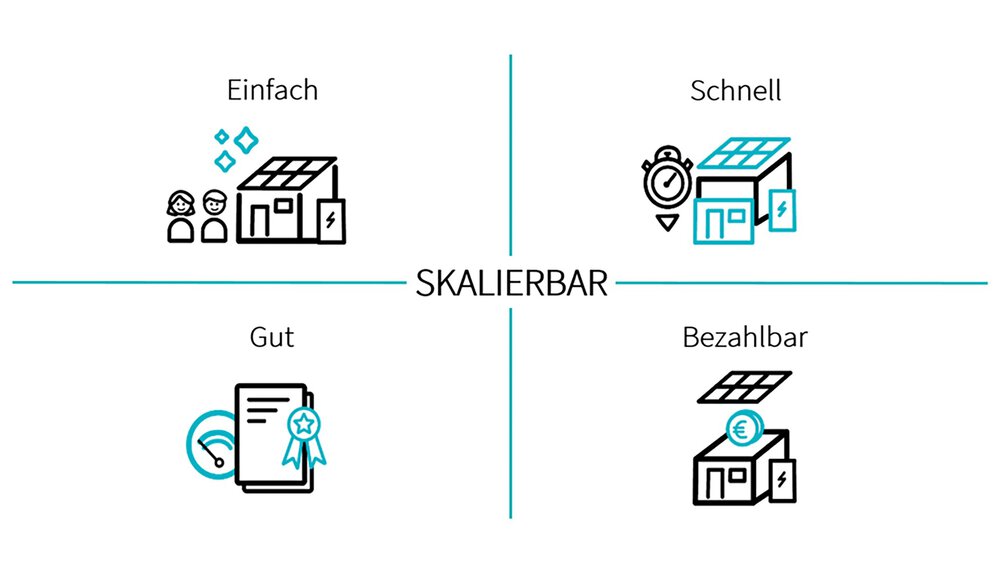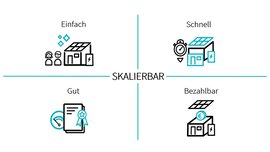Will the refurbishment rate make the urgently needed leap with Energiesprong?
Interview with Simone Alexia Saiegh, Senior Expert Innovation & Transformation, Deutsche Energie-Agentur GmbH (dena)
What advantages does the Energiesprong concept offer compared to conventional refurbishment measures?
Simone Alexia Saiegh: We want the refurbishment of existing buildings to become an easy and quick measure to implement thanks to optimised processes and as few interfaces as possible, which makes a significant contribution to achieving climate protection targets and whose quality assurance is facilitated and sustainably ensured, particularly through prefabrication. The Energiesprong concept offers several advantages over conventional refurbishment measures.
The prefabrication of façade, roof and building services modules in factories and their rapid assembly on site can significantly shorten the refurbishment time. This reduces the burden on residents and enables projects to be realised more quickly. Prefabrication shifts a large part of the added value from the construction site to the factory, which on the one hand enables production to be independent of the weather and thus ensures consistent quality. At the same time, the prefabrication concept responds to the existing shortage of skilled labour and creates additional resources. The standardised and digitalised processes and the economies of scale of prefabrication enable renovation costs to be reduced. This makes energy-efficient refurbishments more economical and affordable and ensures that refurbishments remain affordable for tenants and owners. In terms of energy efficiency and climate protection, Energy Sprong refurbishments aim to ideally bring buildings up to a NetZero standard, where they generate as much renewable energy as they consume on an annual average. This leads to a significant reduction in energy consumption and energy costs.

What obstacles, but also what opportunities, currently exist for a broad implementation of the Energiesprong concept?
Simone Alexia Saiegh: As with all new concepts, there are a number of challenges when it comes to scaling up. Even though the costs have already fallen compared to the first pilots, they are still higher than those of a conventional refurbishment of the building envelope with an ETICS façade. This difference is currently offset by a bonus in the BEG subsidy, so that the realisation is still cost-effective. However, there is still further cost reduction potential here, which can be exploited with increasing standardisation, digitalisation and scaling. The net zero energy approach significantly upgrades existing buildings, benefiting building owners, tenants and not least the environment. In addition, regulatory hurdles due to different building regulations and authorisation procedures in the individual countries and regions as well as adaptation to different building types and local conditions make rapid scalability difficult.
Where we are already seeing success is in the acceptance and awareness of the benefits of serial refurbishment among owners and tenants. As a market development team, we are therefore working on further spreading the concept and bringing the various market players together. Many successfully implemented projects and also the findings from the pilot projects, such as the reduction of the installation time from 40 to 4 days or the use of detailed 3D scans for the inventory, show that the concept works. In order to further expand the Energiesprong concept, several developments are necessary, including in scaling and standardisation, technological innovations, financing models and regulatory adjustments.
As part of the market development team, you are responsible for selecting the right partners for the Energiesprong concept. How do you select them?
Simone Alexia Saiegh: As the dena Competence Centre for Serial Refurbishment, we coordinate the international Energiesprong initiative in Germany. On behalf of the Federal Ministry for Economic Affairs and Climate Protection, we are working with our partners to accelerate the market development of serial refurbishment solutions. Construction companies and parties involved in construction usually already have an idea of what services they can and want to offer in the future or have already realised their first smaller projects. We provide our provider platform for visibility and invite the companies to one of the next upcoming events with the aim of entering into a personal dialogue with us and other market participants. The networking programme is an important part of the Energiesprong concept has the necessary innovations can only be created through exchange and cooperation. In addition, we support the housing companies in evaluating their portfolio with the help of a portfolio analysis, in the concrete selection of projects and the first steps such as subsidy advice and profitability analyses, as well as in the search for a suitable implementer.










Background
Energiesprong is an innovative approach to energy-efficient building refurbishment. The concept originated in the Netherlands, meaning ‘energy leap’, and aims to quickly and efficiently refurbish buildings to NetZero standard. The idea behind serial refurbishment is to significantly speed up refurbishment processes by using prefabricated elements for façades, roofs and energy technology and to achieve long-term cost benefits through economies of scale and standardisation. In Germany, serial refurbishment based on the Energiesprong principle is becoming increasingly important, particularly in the refurbishment of residential buildings, but also in public buildings such as schools, offices and administrative buildings.
Simone Alexia Saiegh looks after existing stakeholders and is the contact person for acquiring new construction companies, architects and engineers. She organises the Energiesprong events & networking events. She benefits from many years of experience in the construction and event industry.
